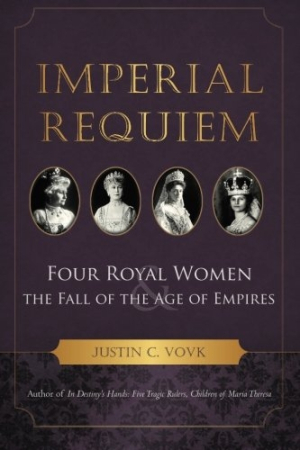Imperial Requiem
Four Royal Women and the Fall of the Age of Empires
- 2014 INDIES Winner
- Bronze, Women's Studies (Adult Nonfiction)
Personal letters humanize famous imperial women to bring a new perspective on World War I–era Europe.
A century has passed since the First World War, a conflict that essentially marked the end of an era that began with Charlemagne. By the time the war came to a close, the influence of the great houses of Europe had crumbled, and imperial life as it had been known for centuries was no more. The story of the men heading those royal families at the time is well documented. But what of the women? Independent historian and researcher Justin Vovk addresses this question in his fascinating and thorough history, Imperial Requiem: Four Royal Women and the Fall of the Age of Empires.
The book takes a comprehensive look at the lives of four women in the most prominent places in imperial life. Augusta Victoria was the wife of Wilhelm II, king of Prussia. Alexandra, perhaps the most famous of the four women, was the wife of Czar Nicholas II, last of the czars. Zita, empress of Austria and and queen of Hungary, was the wife of Charles I. Mary, wife to King George V of Great Britain, held the titles of queen of England and empress of India.
Vovk excels in bringing a relevant, human dimension to the stories of women who lived in unparalleled social positions, in a world that is long gone by. Given how difficult it can be for a reader—especially one not well versed in the perplexing turn-of-the-century political and social climate—to view the various kings and emperors as human beings rather than merely impressive titles, the task of making the famous women of the time approachable to the reader is rather daunting. It seems to be to Vovk’s advantage, however, to focus on the women, as it brings a look at their loves, their children, and the relationships and interpersonal dramas within the families, as well as those on the national and international scale. History books focusing on men might fall into the dehumanizing approach of looking only at various treaties, laws, and battles. These women were separate from warmongering and legislation but just as deep in the structures of power as their more-famous husbands.
Vovk, obviously a diligent researcher, further expresses the humanity of his subjects through copious reference to correspondence. In letters, the reader can see both the emotion and restraint in place in the lives of these powerful women. For example, Zita reveals that, at a family meal in 1914, her uncle Franz Ferdinand declared with certainty that he would soon be murdered. Elsewhere in the book, we learn of Alexandra’s faith and heartache at her son’s painful struggle with hemophilia. Such personal touches run through the book.
Though large, long, and complex, Imperial Requiem remains highly readable throughout. The text is supplemented by copious footnotes, an extensive bibliography, detailed family trees, and an index. Imperial Requiem presents a fresh and engaging view of lives at the end of an era.
Reviewed by
Jason Henninger
Disclosure: This article is not an endorsement, but a review. The publisher of this book provided free copies of the book and paid a small fee to have their book reviewed by a professional reviewer. Foreword Reviews and Clarion Reviews make no guarantee that the publisher will receive a positive review. Foreword Magazine, Inc. is disclosing this in accordance with the Federal Trade Commission’s 16 CFR, Part 255.

